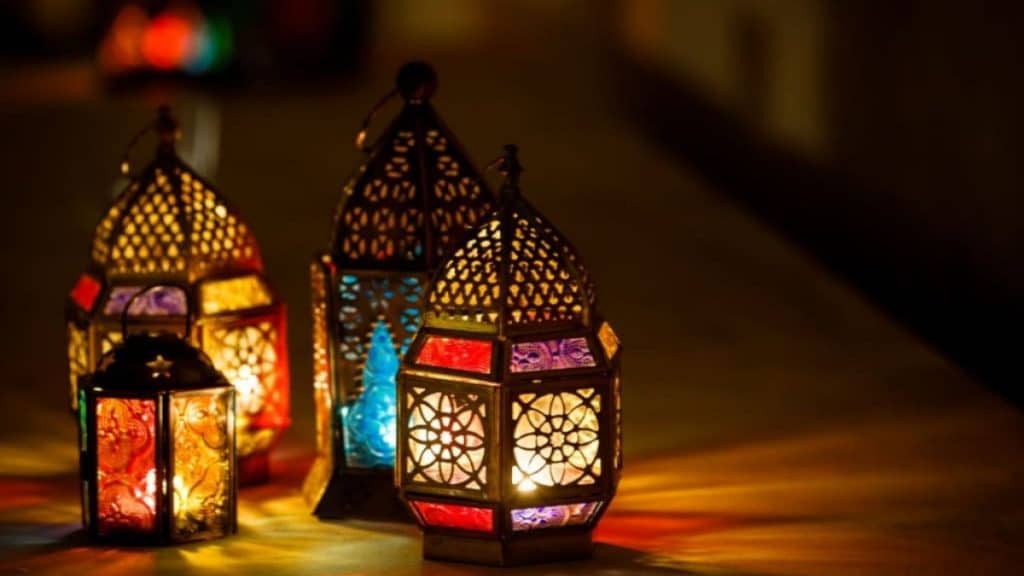During the holy month of Ramadan, many diverse events, celebrations and festivals are held in Abu Dhabi. The Emirati people also preserve the traditional character and ancient heritage of the UAE and work to revive the customs and traditions they inherited from their ancestors by holding sessions dedicated to this.
If you are a fan of authenticity, authenticity and ancient Arab civilizations, and if you are interested in learning more about Arab Islamic civilizations, Abu Dhabi can be your suitable destination during the month of Ramadan, where you will find cultural events, poetry evenings and traditional arts workshops. Here are the most important inherited customs and traditions in Abu Dhabi that have been passed down through generations during the holy month of Ramadan:
Ramadan Decorations in Abu Dhabi
The city of Abu Dhabi is decorated with the most beautiful decorations, shapes, pictures and lights during the holy month of Ramadan. Ramadan lanterns are also hung in the streets, where these lanterns take the shape of a star or a crescent. These lanterns reflect the great joy with which the Emirati people welcome the holy month of Ramadan. People also hang decorations on the balconies of their homes, on windows and at the entrances of homes. Homes are also decorated from the inside with Ramadan decorations that reflect the reassurance and tranquility that Muslims feel during the holy month of Ramadan with its blessed days and nights.
Religious and Social Events
During the month of Ramadan, the General Authority of Islamic Affairs and Endowments and Islamic organizations in Abu Dhabi organize many religious seminars and lectures that provide information about the obligatory acts of worship during the holy month of Ramadan, such as prayer and fasting. These lectures are held in the major mosques in Abu Dhabi. The Zakat Fund also carries out many aid campaigns during the holy month of Ramadan, where it helps the largest possible number of poor families. It also holds educational sessions for citizens and visitors to raise their awareness of the importance of Zakat and its role in society. In addition, each region in Abu Dhabi, in cooperation with the Ministry of Endowments and Islamic Affairs, organizes an agenda for Ramadan events that include competitions for memorizing the Holy Quran, religious lectures in neighborhood councils, cultural programs and dialogue sessions, various initiatives to provide the “Iftar” meal for fasting elderly or disabled people, open sessions to introduce authentic Emirati heritage customs and traditions, and participation in preparing Iftar meals with the Abu Dhabi Police.
You can check Abu Dhabi Ramadan Time to know the start and end times of these events so that you can participate in them. You can also follow the official pages of the Abu Dhabi government to see the most important events.
Ramadan Iftar Cannon in Abu Dhabi
The Ramadan cannon has been an integral part of the customs and traditions of Abu Dhabi and all other emirates in Ramadan since the nineteenth century, where children and adults from citizens and visitors gather to see the Iftar cannon that fires the shell announcing the time of “Iftar” every day of the month of Ramadan, as the cannon can be heard from eight to ten kilometers away. Abu Dhabi Police is keen to pay attention to safety standards during the firing of the cannon. The Iftar cannon has become one of the most beautiful customs in the Emirates, as hearing its sound or seeing it is very enjoyable for visitors and citizens. Below we will show you the locations of the Ramadan cannons in Abu Dhabi:
- Ramadan cannons firing locations in Abu Dhabi: Sheikh Zayed Grand Mosque, Qasr Al Hosn, Al Mushrif Council, Formula Parking, Al Shahama, Umm Al Emarat Park
- Ramadan cannons firing locations in Al Ain: Bin Awaidah Mosque (Wedding Hall), Zakher Area, Al Jahili Fort
- Ramadan cannons firing locations in Al Dhafra: ADNOC Parks, Mohammed Al Yasi Council – Al Mirfa
You can view the timings of the Ramadan cannon firing through Ramadan Timetable Abu Dhabi, as the cannons firing coincides with the Maghrib call to prayer.
Tarawih Prayers During the Holy Month of Ramadan
The holy month of Ramadan has a special and great importance and status for all Muslims. In the holy month of Ramadan, the revelation of the Holy Quran was sent down to the Prophet Muhammad on the Night of Power, and the Night of Power is one of the last ten nights of the holy month of Ramadan. During Ramadan, Muslims are committed to fasting from dawn until sunset according to the times specified in the UAE Ramadan Calendar, and they perform the five daily prayers. In addition, Tarawih prayers are held in all mosques in Abu Dhabi and are performed by all Muslims after the Isha prayer. Many Muslims also spend the last ten nights of Ramadan in mosques, where they perform the Qiyam al-Layl prayer during these nights, as the Prophet Muhammad used to do according to reliable narrations. During these nights, Muslims seek forgiveness and the pleasure of Allah, hoping to reach the “night of Al-Qadr”
Conclusion
The holy month of Ramadan is the month of affection, love, and mutual charity, and in Abu Dhabi, these good deeds appear in the actions of Muslims, as Muslims compete to do charitable works, which may not be in the form of money, but can be in preparing the “Iftar” meal for the fasting, or in providing food and goods to poor families, or in providing meals in mosques, tents, public places, and shopping malls as well.
